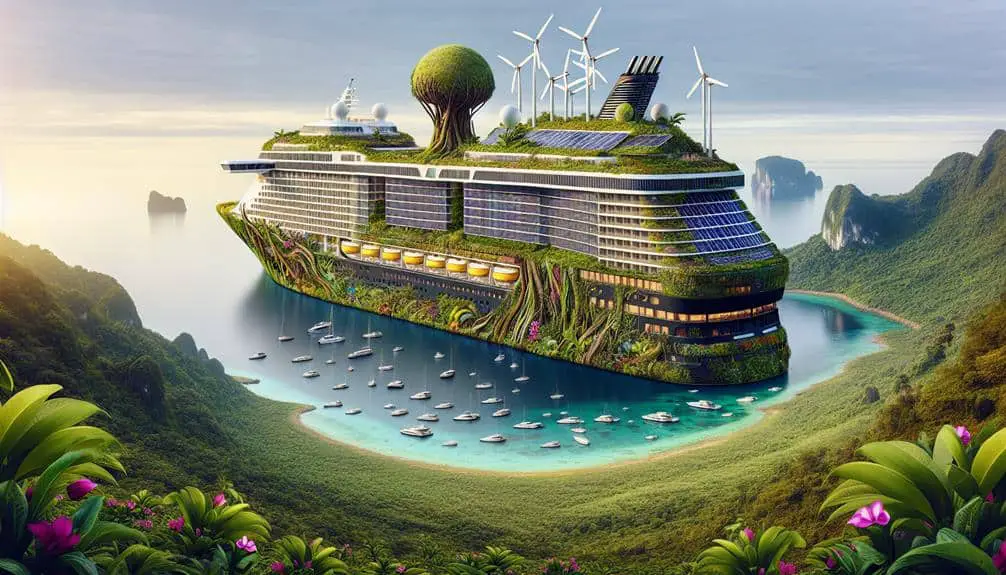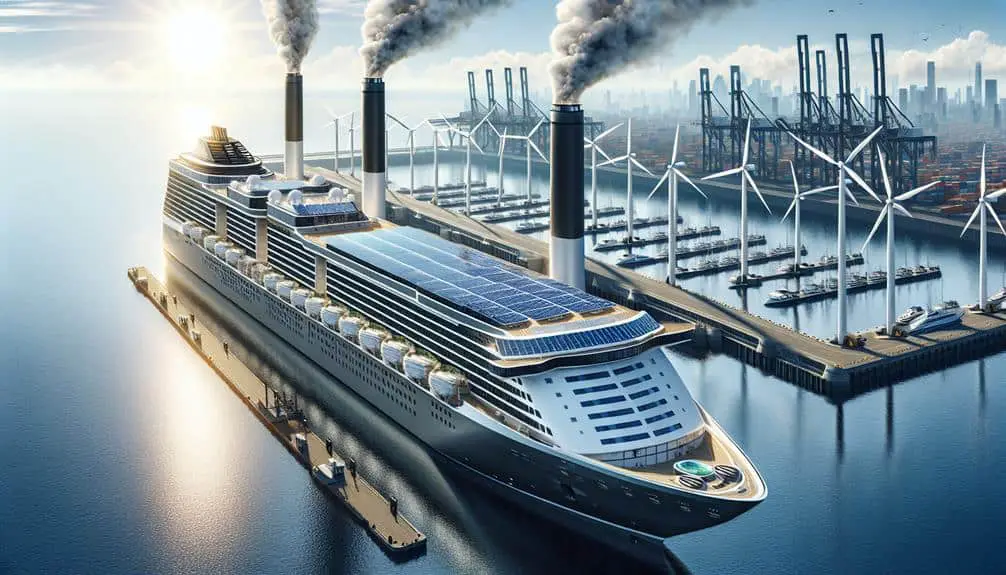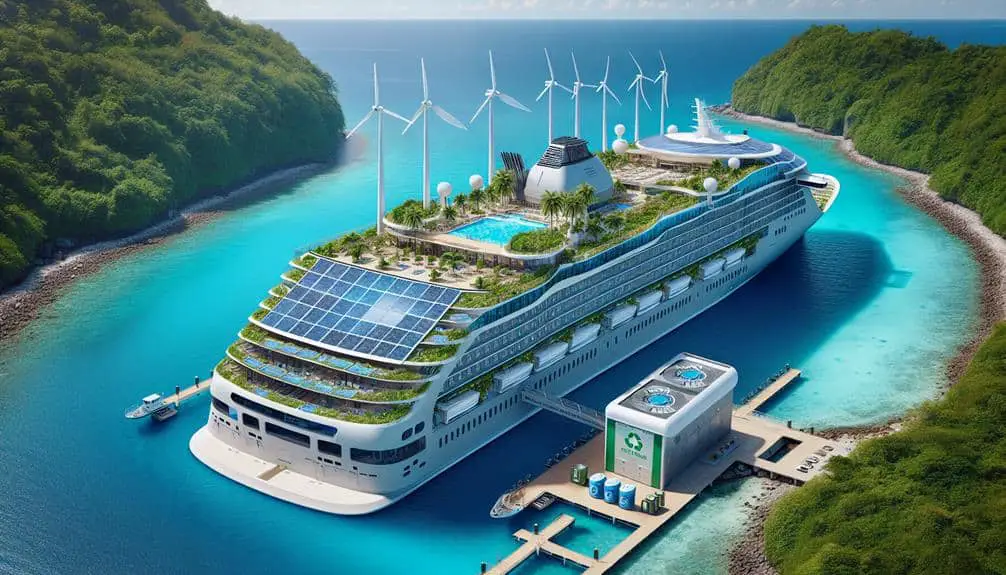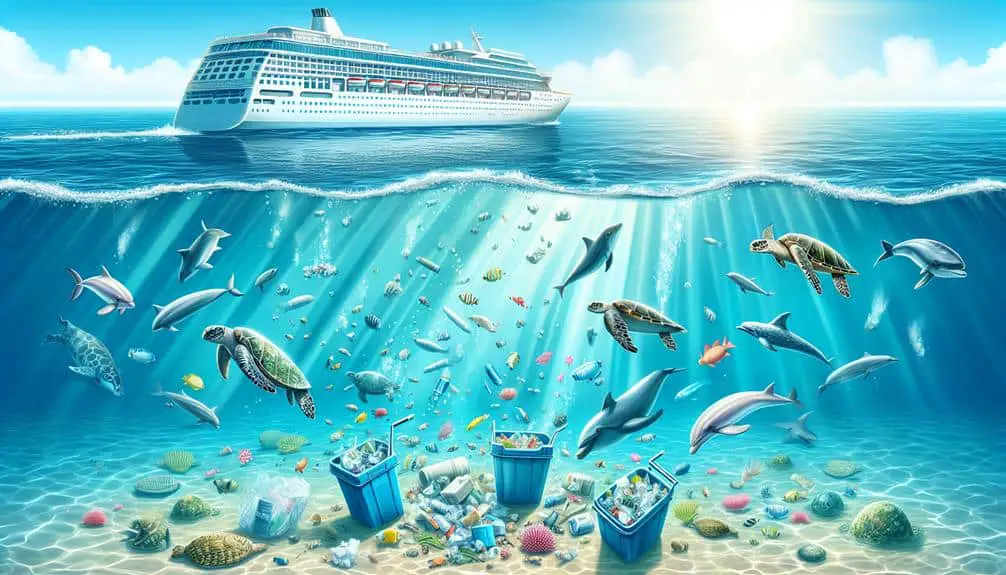To lessen the cruise industry's environmental impact, embrace eco-friendly practices and cutting-edge technologies. Opt for sustainable fuel alternatives like biofuels and electrification to curb emissions. Efficient waste management and recycling reduce harm on the environment, using advanced waste separation systems and prioritizing reusable materials. Collaboration with local communities plays an essential role in fostering sustainability, engaging stakeholders for eco-friendly solutions. Understanding these key strategies is important for minimizing the industry's carbon footprint and marine conservation efforts. Discover in-depth approaches to mitigate environmental impact and promote sustainability initiatives.
Key Points
- Implementing biofuel options and electrification technology reduces emissions.
- Prioritize efficient waste management to decrease environmental impact.
- Engage in community partnerships for sustainable solutions.
- Embrace eco-friendly practices to demonstrate environmental stewardship.
- Educate passengers on responsible tourism practices for positive outcomes.
Cruise Industry Environmental Impact Overview
To understand the scope of environmental impact caused by the cruise industry, you must analyze key factors such as emissions, waste generation, and ecosystem disturbance. The cruise industry has a significant carbon footprint that contributes to climate change. Implementing carbon footprint reduction strategies like utilizing cleaner fuels, optimizing routes, and improving energy efficiency onboard can help mitigate this impact. Embracing eco-friendly practices such as reducing single-use plastics, enhancing recycling programs, and promoting sustainable sourcing can also lead to positive environmental outcomes.
In terms of ocean conservation and marine biodiversity, the cruise industry plays an important role in protecting these ecosystems. By adhering to strict waste management protocols, implementing advanced wastewater treatment systems, and supporting marine conservation efforts, cruise lines can help preserve the delicate balance of marine life. Additionally, educating passengers on the importance of respecting marine environments and engaging in responsible tourism practices can further contribute to the sustainability of our oceans. By prioritizing these initiatives, the cruise industry can work towards a more environmentally friendly and sustainable future.
Regulations and Compliance Standards
Compliance with stringent regulations and industry standards is essential for the cruise sector to address its environmental impact effectively. The cruise industry faces significant compliance challenges due to the complex web of international, national, and local regulations governing its operations. Regulatory updates constantly shape the landscape, requiring cruise lines to stay agile and responsive to evolving standards.
To navigate this intricate framework successfully, cruise companies must invest in robust monitoring systems to guarantee compliance at all levels. Implementing proactive measures, such as regular audits and staff training programs, can help mitigate compliance risks and foster a culture of environmental responsibility within the organization. Collaborating with regulatory bodies and industry stakeholders is also vital to staying ahead of emerging compliance requirements.
Sustainable Fuel Alternatives for Cruises
Traversing the intricate regulatory landscape of the cruise industry requires a strategic shift towards sustainable fuel alternatives to address environmental impact effectively. Biofuel options and electrification technology stand out as promising solutions to reduce emissions and minimize the carbon footprint of cruise operations.
Biofuels, derived from organic materials like algae or waste oils, offer a renewable alternative to traditional fossil fuels. Their lower carbon content and potential for greenhouse gas reductions make them an attractive option for environmentally conscious cruise lines.
Electrification technology, such as hybrid-electric or fully electric propulsion systems, is another avenue for sustainable cruising. By integrating battery power with traditional engines, ships can reduce their reliance on diesel fuel and limit harmful exhaust emissions. This change towards electrification not only benefits the environment but also enhances energy efficiency, paving the way for a more sustainable future in the cruise industry.
Embracing these sustainable fuel alternatives demonstrates a commitment to environmental stewardship while meeting the demands of a changing regulatory landscape.
Waste Management and Recycling Practices
Implementing efficient waste management and recycling practices is essential for reducing environmental impact in the cruise industry. Waste reduction strategies can greatly minimize the ecological footprint of cruise ships. By prioritizing the use of reusable materials onboard, such as durable dishware and refillable amenities, cruise lines can decrease the amount of single-use plastics generated.
Implementing advanced waste separation systems enables effective recycling of glass, paper, plastics, and metals, diverting these materials from landfills. Data analysis plays an important role in identifying waste generation hotspots and optimizing recycling processes. Collaborating with waste management experts can provide valuable insights into innovative recycling technologies and best practices.
Cruise companies that invest in thorough waste management plans not only promote sustainability but also enhance their corporate image. Embracing waste reduction initiatives and incorporating reusable materials into daily operations are key steps towards achieving a more environmentally friendly cruise industry.
Collaboration With Local Communities
To reduce environmental impact and foster sustainability, cruise lines can enhance their operations through collaborating with local communities. Community engagement is essential for cruise companies to establish eco-friendly partnerships that benefit both the environment and local residents. By working closely with communities, cruise lines can develop initiatives that support environmental conservation efforts and promote responsible tourism practices.
Effective collaboration with local communities involves engaging stakeholders in decision-making processes, seeking input on sustainable initiatives, and implementing projects that address community needs while minimizing environmental impact. Establishing eco-friendly partnerships with local organizations can lead to the development of innovative solutions for waste management, energy efficiency, and water conservation.
Furthermore, cruise lines can support local economies through partnerships that prioritize hiring local residents, sourcing goods and services from community businesses, and investing in infrastructure projects that benefit the region. By fostering strong relationships with local communities, cruise lines can create a more sustainable and responsible approach to tourism that supports environmental conservation and social well-being.
Frequently Asked Questions
How Do Cruise Ships Handle Medical Waste Disposal?
When it comes to medical waste disposal on cruise ships, recycling programs and composting methods are often utilized. Incineration techniques and sterilization procedures are also employed to guarantee proper handling and minimize environmental impact.
What Measures Are in Place to Prevent Oil Spills From Cruise Ships?
When it comes to preventing oil spills from cruise ships, you must focus on emergency response protocols and prevention measures. Rigorous environmental monitoring and the adoption of clean technologies are essential in safeguarding our oceans.
Are There Any Initiatives in Place to Reduce Noise Pollution Caused by Cruise Ships?
To reduce noise pollution from cruise ships, initiatives focus on noise reduction technologies, speed restrictions near shorelines, and community engagement for feedback on noise levels. These efforts aim to balance industry needs with environmental concerns effectively.
How Do Cruise Companies Handle the Disposal of Sewage and Wastewater?
To handle sewage and wastewater, cruise companies employ advanced waste management systems. They prioritize energy efficiency by utilizing technologies like onboard treatment plants. These systems guarantee compliance with environmental regulations and minimize the impact of waste disposal on marine ecosystems.
What Steps Are Being Taken to Address the Impact of Cruise Ship Tourism on Local Wildlife and Ecosystems?
To address the impact of cruise ship tourism on local wildlife and ecosystems, ecotourism practices are being enhanced. Marine conservation efforts have increased by 30% in popular cruise destinations, ensuring a sustainable future for both tourists and the environment.




